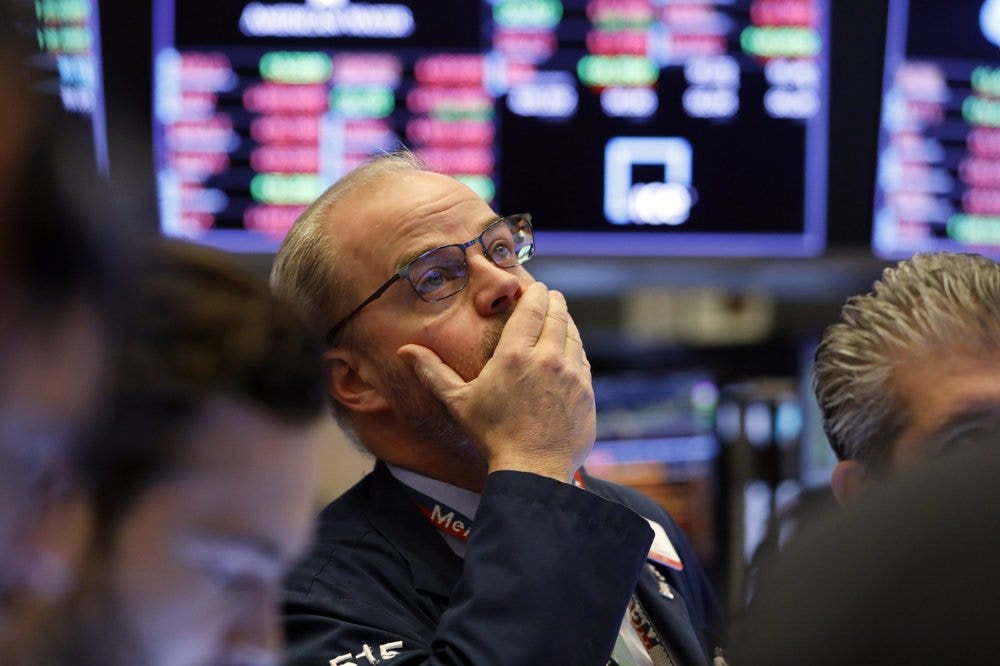
FOX Business' Jackie DeAngelis breaks down how coronavirus fears impacted stocks.
U.S. equity futures are pointing to a higher open in an attempt to halt the biggest plunge in stocks since the financial crisis.
Continue Reading Below
The major futures indexes are indicating a gain of 1.8 percent, or again of more than 400 Dow points, when trading begins on Wall Street.
Asian shares came charging back Monday from last week's retreat, with mainland Chinese benchmarks gaining 3 percent as data showed progress in restoring factory output after weeks of disruptions from the viral outbreak.
Japan's Nikkei 225 recovered from early losses, gaining 1 percent, while the Shanghai Composite index rose 3.1 percent. The Hang Seng in Hong Kong jumped 0.6 percent.
In Europe, stocks are rising on hopes of central bank stimulus. London's FTSE is up 2.8 percent, Germany's DAX is gaining 1.8 percent and France's CAC added 2 percent.
Stocks sank Friday on Wall Street, extending a rout that left the market with its worst week since October 2008. Meanwhile, bond prices have soared as investors sought safety, pushing yields to record lows.
| Ticker | Security | Last | Change | Change % |
|---|---|---|---|---|
| I:DJI | DOW JONES AVERAGES | 25409.36 | -357.28 | -1.39% |
| SP500 | S&P 500 | 2954.22 | -24.54 | -0.82% |
| I:COMP | NASDAQ COMPOSITE INDEX | 8567.367588 | +0.89 | +0.01% |
The Dow fell 1.4 percent to 25,409.36. The S&P 500 slid 0.8 percent to 2,954.22, while the Nasdaq rose 0.1%, to 8,567.37.
The damage from the week of relentless selling was eye-popping: The Dow Jones Industrial Average fell 3,583 points, or 12.4 percent. Microsoft and Apple, the two most valuable companies in the S&P 500, lost a combined $300 billion. In a sign of the severity of the concern about the possible economic blow, the price of oil sank 16 percent.
The market's losses moderated Friday after the Federal Reserve released a statement saying it stood ready to help the economy if needed. Investors increasingly expect the Fed to cut rates at its next policy meeting in mid-March.
The virus outbreak that began in central China has rattled markets as authorities shut down industrial centers, emptying shops and severely crimping travel all over the world. Companies are warning investors that their finances will take a hit because of disruptions to supply chains and sales. Governments are taking increasingly drastic measures as they scramble to contain the virus.
The rout has knocked every major index into what market watchers call a “correction,” or a fall of 10 percent or more from a peak. The last time that occurred was in late 2018, as a tariff war with China was escalating. Market watchers have said for months that stocks were overpriced and long overdue for another pullback.
AUTHORITIES ANNOUNCE 2ND CORONAVIRUS DEATH IN US
The latest losses have wiped out the S&P 500's gains going back to October. The benchmark index is still up 6.1 percent over the past 12 months, not including dividends. Its weekly loss of 11.5 percent was the biggest since an 18.2 percent drop in the week ending October 10, 2008.
Bond prices soared again as investors sought safety and became more pessimistic about the economy's prospects. That pushed yields to more record lows. The yield on the 10-year Treasury note, a benchmark for home mortgages and many other loans, was at 1.10 percent on Monday, from 1.14 percent Friday and 1.30 percent late Thursday. That's a record low, according to TradeWeb.
Crude oil prices also rebounded Monday. U.S. benchmark crude gained 3.6 percent, or $1.62 to $46.37 per barrel in electronic trading on the New York Mercantile Exchange. It sank 4.9 percent on Friday over worries that global travel and shipping will be severely crimped, hurting demand for energy. The price of benchmark U.S. crude fell 15 percent last week.
Brent crude, the international standard, jumped $1.91 to $51.59 per barrel.
The virus hit China in December and shut down large swaths of that nation by late January. China is still the hardest hit country and has most of the 86,000 cases worldwide and related deaths. Its spread far beyond China has caused panic, dashing hopes for containment.
CORONAVIRUS-WORRIED SHOPPERS EMPTY CALIFORNIA, OREGON GROCERY SHELVES
Nearly 60 nations representing every continent, except Antarctica, have confirmed cases.
The latest data show China’s manufacturing plunged in February as anti-virus controls shut down much of the world’s second-largest economy.
A monthly purchasing managers’ index released Monday by Caixin magazine fell to 40.3 from January’s 51.1 on a 100-point scale on which numbers below 50 show activity contracting. A separate PMI released Saturday by the National Bureau of Statistics and the China Federation of Logistics & Purchasing fell to 35.7 from January’s 50.
Despite the plunge, business confidence rose to a five-year high after the ruling Communist Party launched efforts to revive industry with tax cuts and other aid, Caixin said.
“Manufacturers were confident that output would rise over the next year,” the magazine said in a statement.
CLICK HERE TO READ MORE ON FOX BUSINESS
Gold, another safe haven for investors, jumped $38.90 to $1,605.60 per ounce, silver picked up 55 cents to $17.01 per ounce and copper gained 4 cents to $2.58 per pound.
The Associated Press contribute to this article.
"street" - Google News
March 02, 2020 at 12:10PM
https://ift.tt/32HUvMz
Stocks halt slide after decimating week on Wall Street - Fox Business
"street" - Google News
https://ift.tt/2Ql4mmJ
Shoes Man Tutorial
Pos News Update
Meme Update
Korean Entertainment News
Japan News Update


No comments:
Post a Comment